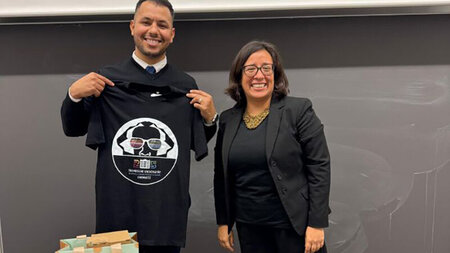DriveMe
Driving style modeling in highly automated driving based on the driver-vehicle-interaction
Partners
Professorship of Ergonomics and Innovation Management
Professorship of Communications Engineering
Funding
BMBF (Federal Ministry of Education and Research)
Duration
02/2015-01/2016
Description
In the near future, the realization of highly automated driving will open up new prospects for the individual mobility of all age groups, but also raise new questions of human-machine-interaction. These questions are topic of the interdisciplinary research project DriveMe. Aim of the project is the modeling of an automated driving style experienced as comfortable, which is a basic condition for the wide acceptance of automated driving. Therefore, two sub-studies are conducted: In a driving simulator study, driving parameters that are relevant for the driving experience are determined and transferred to various individually adjusted driving styles on the basis of the drivers' manual driving styles. These automated driving styles are evaluated with reverence to experienced driving comfort, acceptance, and trust in automation within the scope of the driving simulator study as well as in a test track study.
| Contact | Dipl. Psych. Franziska Hartwich |
|---|---|
| People | Prof. Dr. Josef F. Krems, Dr. Matthias Beggiato (Coordinator), Dr.-Ing. Martin Jentsch, Dipl. Ing. Philipp Lindner |
Publications, talks, poster
Beggiato, M., Hartwich, F., & Krems, J. F. (2017). Der Einfluss von Fahrermerkmalen auf den erlebten Fahrkomfort im hochautomatisierten Fahren. at - Automatisierungstechnik, 65(7). doi:10.1515/auto-2016-0130
Beggiato, M., Hartwich, F., & Krems, J. (2017). Automated Driving Experience under Simulated and Real World Conditions. InnoTesting conference, Wildau (Berlin), February 23 - 24, 2017.
Hartwich, F., Beggiato, M., & Krems, J. F. (2018). Driving comfort, enjoyment, and acceptance of automated driving - Effects of drivers' age and driving style familiarity. Ergonomics. doi: 10.1080/00140139.2018.1441448
Hartwich, F. , Beggiato, M., & Krems, J. (2016). The impact of automation on older and younger drivers' perception of driving comfort and joy. In J. Funke, J. Rummel, & A. Voß (Eds.), TeaP 2016 - Abstracts of the 58th Conference of Experimental Psychology (p. 118). Lengerich: Pabst Science Publishers.
Hartwich, F., Witzlack, C., Beggiato, M., & Krems, J. F. (2019). The first impression counts - A combined driving simulator and test track study on the development of trust and acceptance of highly automated driving. Transportation Research Part F: Traffic Psychology and Behaviour, 65, 522–535. https://doi.org/10.1016/j.trf.2018.05.012
Hartwich, F., Pech, T., Schubert, D., Scherer, S., Dettmann, A., Beggiato, M., Wanielik, G., Bullinger-Hoffmann, A., & Krems, J. F. (2016). Fahrstilmodellierung im hochautomatisierten Fahren auf Basis der Fahrer-Fahrzeuginteraktion. Abschlussbericht "DriveMe". doi:10.2314/GBV:870302329 (Volltext)
Hartwich, F., Beggiato, M., Dettmann, A., & Krems, J.F. (2015). Drive me Comfortable: Individual Customized Automated Driving Styles for Younger and Older Drivers. In VDI (Eds.). Der Fahrer im 21. Jahrhundert. VDI-Berichte 2264 (pp.271-283). Düsseldorf: VDI-Verlag.
Krems, J., Hartwich, F., Beggiato, M., & Dettmann, A. (2017). Drive me comfortable. Poster presented at the 4th International Conference Aging & Cognition 2017, Zurich, April 20 - 22, 2017.
Scherer, S., Dettmann, A., Hartwich, F. & Bullinger, A. C. (2015). Wie will der Fahrer automatisiert gefahren werden? - Überprüfung verschiedener Fahrstile hinsichtlich des Komforterlebens. In VDI Wissensforum GmbH (Ed.), 32. VDI/VW-Gemeinschaftstagung Fahrerassistenz und automatisiertes Fahren. VDI-Berichte 2288 (pp. 299-310). Düsseldorf: VDI-Verlag.
Scherer, S., Dettmann, A., Hartwich, F., Pech, T., Bullinger, A. C., & Wanielik, G. (2015). How the Driver Wants to Be Driven – Modelling Individual Driving Styles in Highly Automated Driving. 7. Tagung Fahrerassistenz, München, 25.-26.11.2015. https://mediatum.ub.tum.de/doc/1294967/1294967.pdf
Scherer, S., Jentsch, M., Hartwich, F., & Bullinger, A. C. (2015). Modelling individual driving styles in highly automated driving. In A. C. Bullinger (Ed.), Mensch 2020 – transdisziplinäre Perspektiven (p. 419-422). Chemnitz: Verlag aw&I Wissenschaft und Praxis. ISBN 978-3-944192-04-8.




